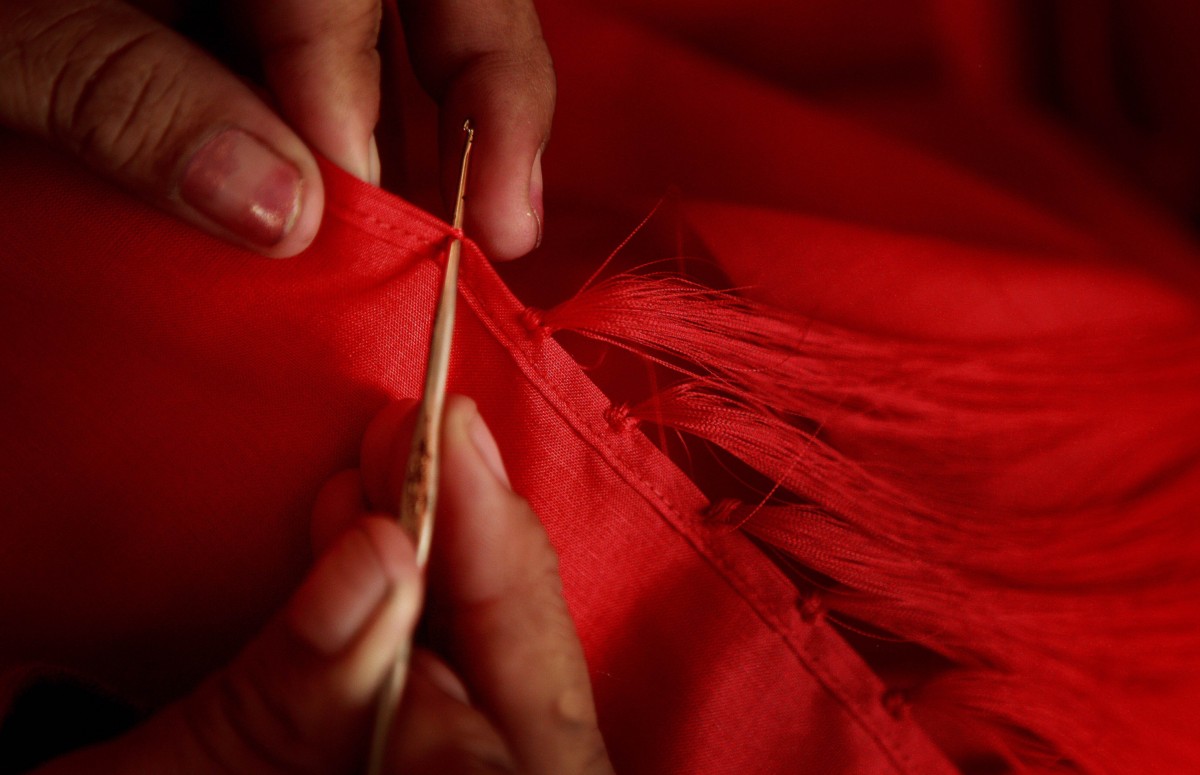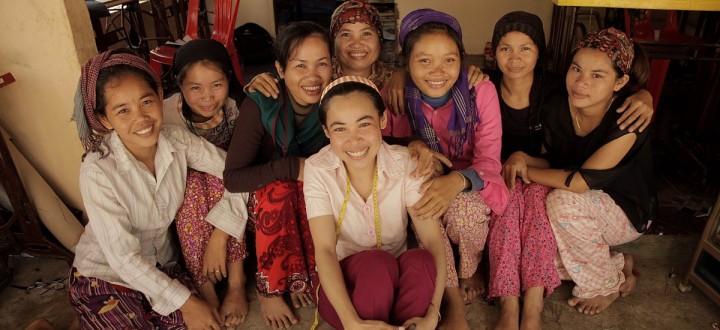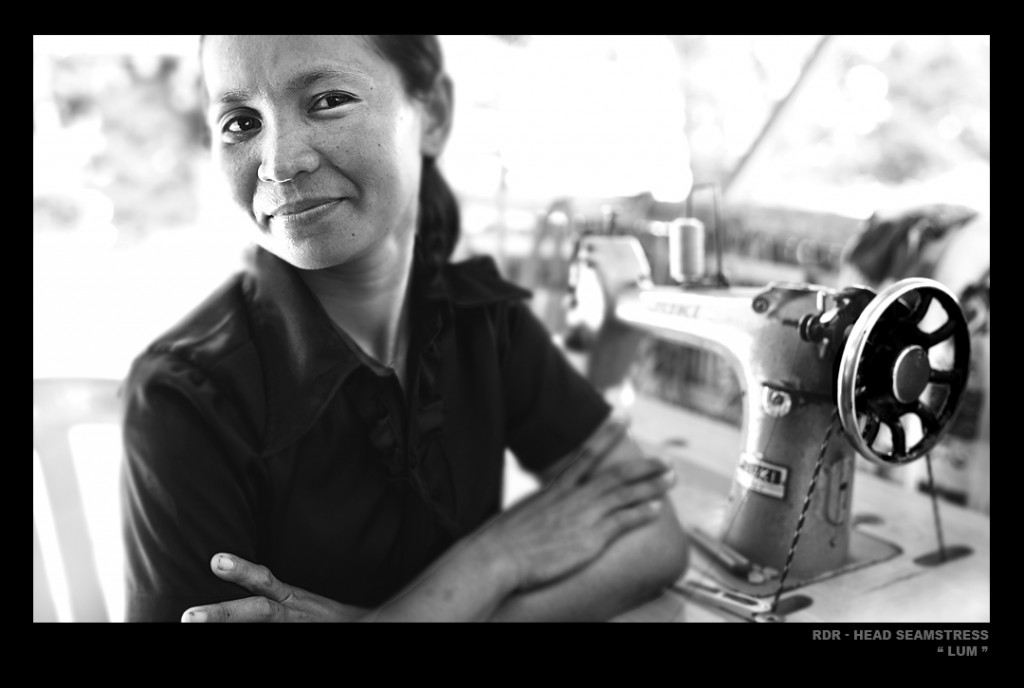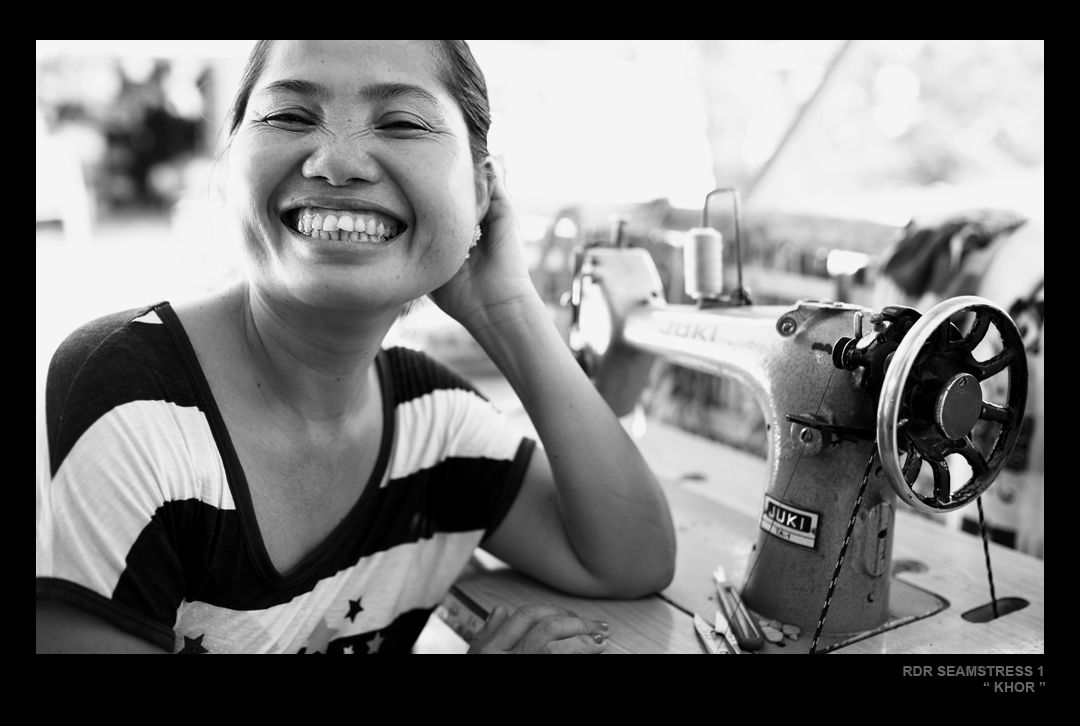In rural Cambodia, on the edge of the Mekong River, a red dirt road barely accommodates the lone minivan as it winds its way over bumps and hairpin turns. Top-heavy palm trees sporadically interrupt the evenness of the grassy plains. Periodically, a cow stands alongside the occasional home. Once off the highway, there is not another vehicle to be seen.
Just a few hours outside of Phnom Penh this is the road to the village of Tramung Chrum, where a group of eight women have taken their lives and livelihoods in hand with a sisterhood that spans the globe, spinning better lives out of whole cloth and changing the world one stitch at a time. This is Red Dirt Road.
Hab Saly, a petite 30-year old with bright eyes, moves effortlessly through her parents’ house, the front room open on three sides to let in air and light. For three years, this has been home to a network of her sisters and friends who bend over their foot-powered treadle sewing machines or sit cross-legged on the floor, affixing decorations to beautifully crafted purses, headbands, and other accessories sold under the brand Red Dirt Road. The children run in from school for a snack of fruit and out again to play in the street, the watchful eyes of a room full of mothers upon them.
This homegrown operation is light-years away from the dirt, noise, and daily grind of the country’s garment industry, which produces $5.7 billion in clothing and footwear each year on the backs of young women who work for low wages in egregious conditions. In Cambodia, few young women receive an education beyond sixth grade; most are taken from school to work in the rice fields or are forced to leave their families to work in the thriving garment industry. Arranged marriages and sex trafficking is also commonplace.
In 2007, Dr. Alan Lightman, the acclaimed author and professor of physics and the humanities at MIT, founded the Harpswell Foundation, an organization that provides education, housing, and leadership training to children and young women in Cambodia. In 2008, his daughter, Elyse Lightman Samuels, traveled to Cambodia, where she met Saly, who was then working at a garment factory in in Phnom Penh. Elyse saw a vision for a different future in Saly’s eyes, and asked one fateful question: “If you could do anything, what would it be?”
“I would train as a seamstress and start my own sewing business in my village.”
A small capital infusion from the Harpswell Foundation funded the purchase of four treadle sewing machines, along with several bolts of cotton, silk, and linen fabric and other supplies. But a business requires more than supply. It demands a market.
“My basement is clean. My mother’s basement is clean. Kevin is leaving for college. I’m flunking retirement. Do you have any ideas?”
That’s the call I received from my friend and former boss, Marie Eckstein, one morning in 2011. One week earlier, I had been introduced to Alan Lightman, and learned of his work. I was intrigued not only by his commitment to enable the education of the most promising young women of Cambodia, but also for his vision to improve the livelihoods of women in Cambodia’s rural villages. I thought supporting this important venture could be just the challenge for Marie, who had spent her thirty-year international business career forging new paths for women in the global specialty materials market.
Within weeks, Marie was on a flight to Cambodia with Alan, and soon in the center of the village, reviewing the results of what Alan then called “the Sewing Business.” It was a disaster. No one bought the men’s shirts or women’s dresses that the women had made. They had not sold a single item. “I was immediately captured by Saly’s spirit and what she wanted to accomplish,” Marie said. “We are not so very different, you know.”
“We share similar dreams—a safe environment, a chance to make better lives for our children. And women are most often the driving force behind these things. It doesn’t really matter where you live,” said Marie, pausing momentarily. “There is this universal sisterhood,” she insisted. “We must help each other.”
Returning to the United States, Marie called on her own network of women business leaders to help turn “The Sewing Business” into a sustainable operation—a business that could sustain the women with a living wage as well as an opportunity to share the profits with the village. Laura Wolak developed a marketing and e-commerce strategy; Julie Battle developed the brand and communications. Linda Allesio, an award winning teacher and entrepreneur in her own right, worked with the women to develop their designs and set not only the standard for high quality, but also the process to deliver it. Marie relied on her extensive international business experience and a wide personal network to move the products. In addition to selling items online, she persuaded her friends to host house parties that featured the products, and in turn this led to opportunities to feature products in high end boutiques in northern Michigan.
Red Dirt Road is still a small business, but isknown among its loyal customers for high quality, unique, handcrafted accessories: art purses, silk evening bags, cell phone cases, distinctive wallets, colorful scarves, and elegant wraps. Since its inception, the women have made and sold over 2,000 items. Cumulative revenues have just gone over the $50,000 mark. Capitalization remains a challenge, along with a myriad of other challenges: product development, supply chain, quality, employee development and engagement, sales channels, and compliance. The language barrier between Marie and the Cambodian craftswomen is always tricky to navigate, as is the ever-changing nature of fashion trends and tastes that mean the products the women produce necessarily have a shelf life. Even so, a small business makes a huge difference. Working part time at their own business, the women earn as much as they did when working full-time in the garment industry in Phnom Penh.

Marie’s vision is that Red Dirt Road will grow into something much bigger. Before the end of the year, Red Dirt Road will reach its next pinnacle of achievement, when award winning filmmaker Rodney Rascona releases a documentary film about the project, “Change the world: one stitch at a time; one woman at a time.” In doing so, Rodney and Marie hope to help replicate this model of enterprise and independence in the more than 14,000 villages in Cambodia.
Marie is proud of what the Sewing Project has become, and hopeful for the effect Red Dirt Road’s expansion could have on the more than seven million women in Cambodia. “We have made a positive impact,” she says, smiling. “These women live at home. They are raising their own children and those children are being educated.” Profits are shared with the community, as well, and because of these connections, the women of Red Dirt Road have small luxuries that help them lead healthier lives. “They have their own gardens. Many have their own latrines now,” says Marie. But most importantly, “they have the respect of their husbands, parents, and neighbors.”
Back in Tramung Chrum, the sewing machine treadles whir in rhythm to the sounds of women turning out both financial and social profit, the red dirt road bending gently toward the promise of a better future for the Saly and all the women of Cambodia.
Photos compliments of ©RodneyRascona2015.
Laura Asiala
Laura Asiala is the Vice President, Public Affairs at PYXERA Global. Passionate about the power of business to solve—or help solve—the world’s most intransigent problems, she leads the efforts to attract more participation of businesses to contribute to sustainable development through their people and their work. She also serves on the Board of Directors for Net Impact, a community of more than 40,000 student and professional leaders creating positive social and environmental change in the workplace.








Marie,
What a great project. Sounds much better than retirement! Glad Laura A shared the link. From small things great things can happen.
Thanks for your continuing support for Red Dirt Road, Laura. You describe the village so well, we are all so appreciative of your trip to the village and your many contributions to The Global Sisterhood!
Hello Laura,
I want to thank you for your insight-words-and the difference you are making for women that so deserve your support…
This presentation of RDR is another example of how you are helping to move RDR and the women in it forward to a new and better life than they have ever known.. They are gaining not just a job and good pay-but in the most important way.. They are gaining the knowledge that they have the skills, power, and the “Chance” to change the lives of themselves and those they love for years to come…
Thank you for all that you are doing-and have done-to make a difference in the lives of so many…
Lin